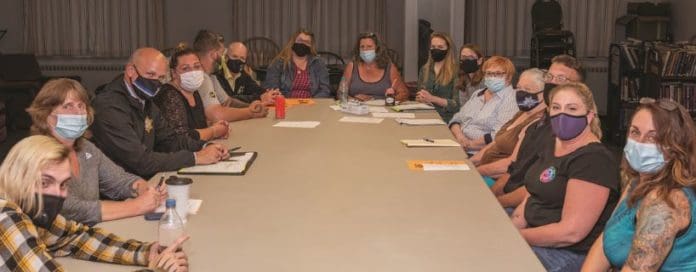In Mid-coast, Getting Out of Jail Comes With Community Support For Recovery
For the latest example of Maine’s long tradition of neighbor helping neighbor, look no further than Community Consultants, a peer-to-peer recovery support program that is now part of discharge planning at the Knox County Jail.
Initiated in 2020 through a grant from the Maine Healthy Alliance Foundation, the program invites members of the community in recovery to attend discharge meetings at the jail. At the meeting, these “community consultants” offer inspiration and real life examples and tips for successfully re-integrating with the community while staying in recovery.
“Our end goal of discharge planning is to have people back in the community … back with their families … while staying in recovery. Hearing what worked for other individuals in recovery is a huge benefit and resource. There’s nothing like people with similar lived experiences sharing what worked and how to get help,” said Sheriff Tim Carroll, who helps to facilitate the program in Knox County.
A Wider Community of Support
There is growing proof that reentry support programs in prisons work, and work well. In addition to support for remaining in recovery, according to an analysis from the National Institute of Justice, recovery related programs can produce statistically significant reductions in recidivism, helping individuals remain in communities rather than return to prison.
In peer-to-peer programs like Community Consultants, peers from the local community share their own lived experiences recovering from addiction, helping to build skills and address specific needs that people with addiction issues often face in early recovery. Connecting with a member of the local recovery community also improves social ties and identifies new positive social environments.
By tapping into local community members who offer up local resources and ways they’ve problem-solved their own recovery issues, Carroll believes this peer-to-peer knowledge is a gamechanger for individuals embarking on life after prison.
“We want people reentering the community and going to work, paying their rent and taxes; programs like Community Consultants are part of how we get people back into the community so they can stay there,” said Carroll.
Incorporating community members in discharge planning meetings also reflects a larger shift in how law enforcement responds to people with substance use and addiction issues.
“We are always looking for programs that can help,” noted Carroll, adding that, “…when people see that we’re there to support their recovery, they are more comfortable talking to law enforcement … they can speak more openly. What we often hear is, ‘this is the first time I’ve been around a cop and felt comfortable.’”
It’s Personal … For Everyone
Carroll has a personal stake in making the Community Consultants program work. Two members of his extended family have experienced drug-related overdoses, including a cousin who lost his struggle with addiction not too long ago.
“He tried his best, but couldn’t get out of the cycle. It’s a disorder. These people deserve help — they are our family members and neighbors. No one is immune from this problem.”
A Growing Program
For now, consultants participate in discharge meetings over Zoom, due to ongoing Covid-19 restrictions. Carroll hopes that eventually consultants will be in the room at meetings.
Waldo County undersheriff Jeffrey Trafton also offers the Community Consultants program. “This is very much a joint effort and partnership between the two counties in serving our communities,” Carroll confirmed.
Any community member with recovery experience who wishes to volunteer as a consultant can contact the Knox County Sheriff’s Office to learn more.



